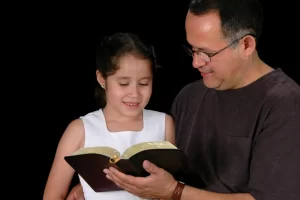a small firm that packs a big punch
- Home
- Attorneys
- Articles
- Practice Areas
- Family Law
- Criminal Defense
- Employment Law
- Personal Injury
- Workers’ Compensation
- Real Estate
- Wills, Trusts & Estates
- Blog
- Courts We Serve
- Contact
- Toggle website search
 Child custody issues are never easy to resolve, even when the parents have an amicable relationship. Religious practices and traditions are a sensitive topic under the best of circumstances. Parental disputes can occur any time there is a disagreement about how the child should be raised. Additional pressure from grandparents and other relatives can be unhelpful and only adds fuel to the fire. Emotional arguments about religion make it difficult for parents to reach an agreement because decisions of this kind can cloud their judgment. A failure to compromise and cooperate can take the argument to litigation. A judge’s primary concern is the child’s best interests, which the precise circumstances of each case can best define. When co-parents can’t agree, the proceedings can be extensive and costly.
Child custody issues are never easy to resolve, even when the parents have an amicable relationship. Religious practices and traditions are a sensitive topic under the best of circumstances. Parental disputes can occur any time there is a disagreement about how the child should be raised. Additional pressure from grandparents and other relatives can be unhelpful and only adds fuel to the fire. Emotional arguments about religion make it difficult for parents to reach an agreement because decisions of this kind can cloud their judgment. A failure to compromise and cooperate can take the argument to litigation. A judge’s primary concern is the child’s best interests, which the precise circumstances of each case can best define. When co-parents can’t agree, the proceedings can be extensive and costly.
Following divorce, parents may disagree on what’s best for their children, particularly regarding religion. New Jersey law clarifies decision-making authority, but a carefully crafted agreement can shape family dynamics. In Passaic City, Union City, Jersey City, Wayne, Little Falls, Woodland Park, Bergenfield, or elsewhere in northern New Jersey, our experienced family law team at Montanari Law Group prioritizes your children’s welfare. We handle your beliefs with care, striving for a resolution that serves their best interests and keeping you informed throughout the process. Feel free to reach out to us for a complimentary consultation at 973-233-4396.
The Parent of Primary Residence or PPR is the parent who has the child residing with them overnight for more than 50% of the year. If the number of overnight visits is the same, the parent living in the child’s school district is the PPR. It is the PPR who decides what religious upbringing the child will have. The Parent of Alternate Residence, or PAR, can expose the child to an alternative belief system but cannot educate the child in that religion. The religion the child was brought up in before the divorce doesn’t have to be the same religion they are taught after the parent’s separation.
The PPR has more control over the child regarding education and upbringing than the PAR. This includes religious participation, affiliation, and customs. The PPR can enroll the child in religious classes or schools, convert them to the religion, and teach them all aspects of it without the other parent’s consent. Ideally, the PAR would accept the PPR’s choice of religion, but unfortunately, it isn’t always the case.
If the PPR agrees, the PAR can choose the religion the child will practice. If the PPR is against any alternative religious instruction or exposure, the PAR cannot continue to require the child to participate in another religion or belief system. They cannot enroll the child in religion classes or educational programs such as bible studies, catechism, Hebrew school, etc. The PAR is allowed to share their religious beliefs with the child and expose them to the religious traditions they hold. Moreover, they can take the child to participate in special celebrations or religious services if the PPR agrees.
Joint legal custody allows parents to make important decisions about the child’s religious affiliation. The ideal situation would be a meeting of the minds with flexibility regarding religious education and participation in ceremonial rites. The court may have to decide for them when that is not true.
A document used by the New Jersey family court for a divorce called a PSA (Property Settlement Agreement) includes the custody order and can contain the parent’s wishes regarding religious practice and instruction for the child. These agreements should be as detailed as possible. They should include what types of ceremonies and services the child will participate in, their frequency, and whether the religious decisions will be made jointly or by one parent. The depth of religious education is also significant. If the parents’ religious beliefs differ, they should express the level of participation the child will have. It is important to keep in mind that this agreement can be changed in court if there is evidence that neither parent wants the child to continue participating in that religion, if one parent objects, or if the child is old enough to decide that they want to enter into a spiritual practice that is apart from the one of which they have been a part.
There is no guarantee that a judge will ratify the agreement if it appears harmful or unfair to the child. Remember that the court’s job is to protect the child before anything else, including religious beliefs. The best agreement is clear, detailed, and fair to everyone involved.
 In the case of Dilisi v. Dilisi, the parents agreed in their PSA that their two daughters would be raised in the Roman Catholic faith and attend a Catholic private school. The parents paid for the tuition in a 50-50 split. The girls completed the Catholic sacraments (baptism, First Penance, First Communion, and Confirmation). Having visited with his daughters every other weekend, the father would take them to a protestant church. The mother would not let the girls go on vacation with him until he agreed not to take them to his church. The father asked the court for help, and his ex-wife demanded that the court forbid him from taking his daughters to his church. The judge sided with the mother because the PSA stipulated that the girls would be raised in the Catholic faith, and if they attended church with either parent, it would have to be a Roman Catholic one.
In the case of Dilisi v. Dilisi, the parents agreed in their PSA that their two daughters would be raised in the Roman Catholic faith and attend a Catholic private school. The parents paid for the tuition in a 50-50 split. The girls completed the Catholic sacraments (baptism, First Penance, First Communion, and Confirmation). Having visited with his daughters every other weekend, the father would take them to a protestant church. The mother would not let the girls go on vacation with him until he agreed not to take them to his church. The father asked the court for help, and his ex-wife demanded that the court forbid him from taking his daughters to his church. The judge sided with the mother because the PSA stipulated that the girls would be raised in the Catholic faith, and if they attended church with either parent, it would have to be a Roman Catholic one.
The father appealed because he claimed the decision was unconstitutional. He won his appeal because the PAR isn’t prohibited from taking their children to services or events to expose them to other faiths. It was also determined that to obligate the father to raise the children only in the Roman Catholic faith was against his constitutional rights, infringing on his right to freedom of religion. The court did say that the father could not interfere with the mother’s continuing support of her daughters’ Catholic upbringing.
All parents want what they believe is best for their children; unfortunately, sometimes, divorced couples cannot agree on what that is, especially when it comes to religion. Their lives change dramatically after their divorce, causing them to develop and grow as individuals, which may mean focusing more on their spiritual lives and wanting their children to practice their religion with them. New Jersey law is clear about who can decide regarding religion, but a written agreement can make a difference for you and your family.
Our skilled family lawyers at Montanari Law Group know a lot is at stake for you and your children in Millburn, Short Hills, Ridgewood, Maplewood, Nutley, Hackensack, Essex Fells, and surrounding areas. We will handle your beliefs with the utmost respect while advocating for you in a custody dispute or contentious divorce battle over your child’s religion. Contact us today at (973) 233-4396 for a free consultation or online by filling out a contact form.